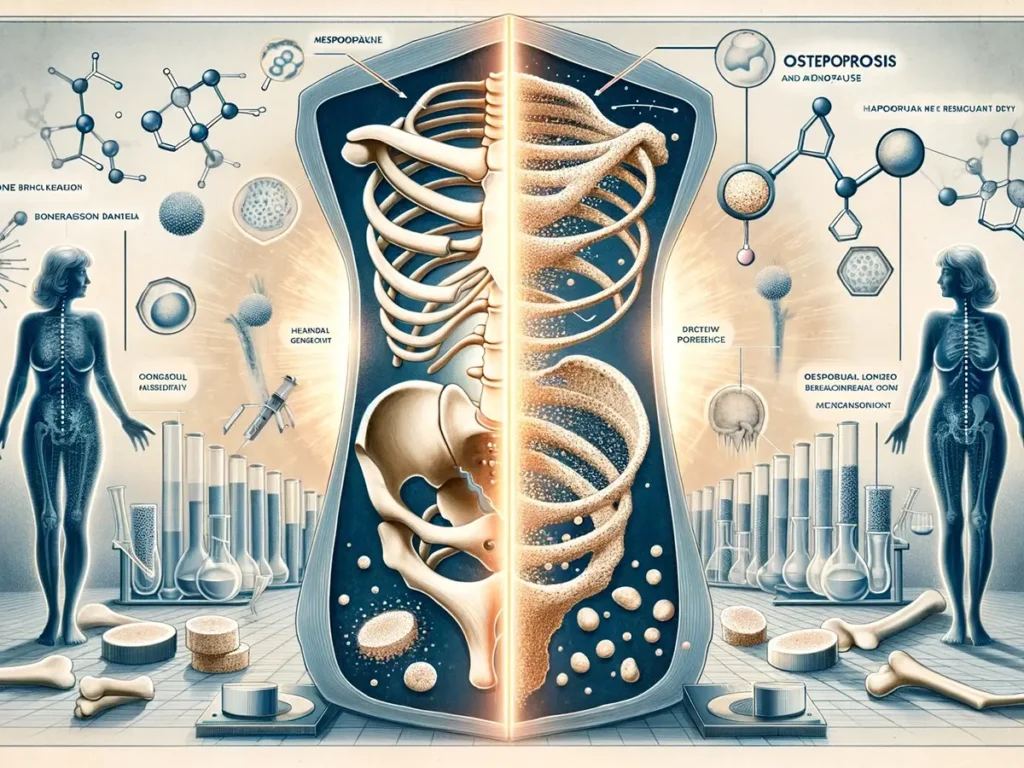Menopause, a biological process marking the end of a woman’s reproductive years, can bring about a myriad of uncomfortable symptoms such as hot flashes, mood swings, and weight gain. The foods we consume during this transitional phase can either exacerbate these discomforts or alleviate them. Understanding the culprits and saviors in our diet is crucial in navigating the hormonal fluctuations and physical changes that come with menopause.
Key Takeaways:
- Phytoestrogens are beneficial: Including foods rich in phytoestrogens, such as soy products, flaxseeds, and legumes, can help alleviate menopausal symptoms by mimicking the role of estrogen in the body.
- Limiting caffeine and alcohol intake: Consuming less caffeine and alcohol can help reduce hot flashes and night sweats, common symptoms experienced during menopause.
- Importance of balanced diet: Maintaining a balanced diet that includes a variety of fruits, vegetables, whole grains, and lean proteins can help manage weight, mood swings, and overall well-being during menopause.
The Science Behind Menopause and Diet
Some of the most common symptoms experienced during menopause, such as hot flashes, mood swings, and weight gain, can be influenced by diet. Understanding the science behind menopause and how it interacts with our nutritional needs can be crucial in managing these discomforts effectively.
Hormonal Changes and Nutritional Needs
Menopause marks a significant hormonal shift in a woman’s body, particularly in the levels of estrogen and progesterone. These changes can impact metabolism, bone health, and overall wellbeing. During this phase, certain nutrients like calcium, vitamin D, and magnesium become even more critical to support bone health and prevent osteoporosis. It is essential to focus on a well-rounded diet rich in fruits, vegetables, whole grains, lean protein, and healthy fats to ensure that the body receives these vital nutrients.
Plus, menopausal women may also benefit from incorporating phytoestrogens into their diet, such as soy products, flaxseeds, and legumes. Phytoestrogens are plant-derived compounds that can mimic the effects of estrogen in the body and help alleviate some menopausal symptoms.
The Gut-Health-Hormone Connection
Changes in hormone levels during menopause can also impact gut health, leading to issues like bloating, constipation, and weight gain. The gut microbiome plays a crucial role in hormone regulation, as certain bacteria can influence estrogen levels. Ensuring a diverse and balanced diet that includes plenty of fiber, prebiotics, and probiotics can support a healthy gut microbiome and potentially help alleviate some menopausal discomforts.
Dietary Culprits of Menopausal Discomfort
Foods That Exacerbate Symptoms
Symptoms of menopause can be exacerbated by certain foods. Foods high in saturated fats, such as red meat and full-fat dairy products, can contribute to increased hot flashes and night sweats. Additionally, spicy foods and caffeine can also trigger these uncomfortable symptoms.
Moreover, processed foods containing artificial additives and preservatives can disrupt hormone balance and exacerbate mood swings and fatigue during menopause. Foods high in refined sugars and carbohydrates may also lead to blood sugar fluctuations, intensifying irritability and disrupting sleep patterns.
The Role of Sugar and Processed Foods
An excess of sugar and processed foods in the diet can have detrimental effects on menopausal symptoms. High sugar intake can lead to inflammation in the body, worsening joint pain and bloating. Processed foods often lack essential nutrients needed to support hormone production and regulation, further exacerbating menopausal discomfort.
With the negative impact of sugar and processed foods on menopausal symptoms, it is crucial to opt for whole, nutrient-dense foods to support hormone balance and alleviate discomfort during this transitional phase.
Caffeine and Alcohol: Triggers of Discomfort
Foods containing caffeine and alcohol can act as triggers for menopausal discomfort. Caffeine, found in coffee, tea, and certain soft drinks, can lead to increased anxiety, sleep disturbances, and hot flashes. Similarly, alcohol consumption can exacerbate mood swings and disrupt sleep quality, intensifying menopausal symptoms.
To manage menopausal discomfort effectively, reducing or eliminating caffeine and alcohol intake can be beneficial. Opting for herbal teas and mocktails as alternatives can help alleviate symptoms and support overall well-being during this phase of life.
Nutritional Saviors of Menopausal Symptoms
To effectively manage menopausal symptoms through diet, it is crucial to incorporate key nutrients that can help alleviate discomfort and promote overall well-being. These nutritional saviors can play a significant role in supporting women during this transitional phase of life.
Phytoestrogens and Their Benefits
An essential group of compounds that can be beneficial for menopausal women are phytoestrogens. Phytoestrogens are plant-derived compounds that possess estrogen-like properties. They can help balance hormone levels in the body, which may help alleviate symptoms such as hot flashes, mood swings, and night sweats. Foods rich in phytoestrogens include soy products, flaxseeds, chickpeas, and lentils.
Research suggests that incorporating phytoestrogen-rich foods into your diet can have positive effects on menopausal symptoms. These plant-based compounds can mimic the action of estrogen in the body, providing relief from hormone-related discomfort. Including a variety of phytoestrogen sources in your meals can be a natural way to support your body during this stage of life.
Essential Vitamins and Minerals for Menopause Management
The adequate intake of essential vitamins and minerals is crucial for managing menopausal symptoms and supporting overall health. Certain nutrients play a key role in supporting hormonal balance, bone health, and energy levels during menopause. Incorporating a variety of nutrient-dense foods can help ensure you are getting the necessary vitamins and minerals your body needs.
The importance of essential vitamins and minerals for menopause management cannot be understated. Nutrients such as vitamin D, calcium, magnesium, and vitamin B complex are particularly important during this phase of life. These nutrients can help support bone health, alleviate fatigue, and balance mood swings commonly associated with menopause. Ensuring you are meeting your daily requirements for these essential vitamins and minerals can help optimize your well-being during this transition.
The Importance of Omega-3 Fatty Acids
With their anti-inflammatory properties and numerous health benefits, omega-3 fatty acids are crucial for menopausal women. These essential fats can help reduce inflammation in the body, which may contribute to alleviating menopausal symptoms such as joint pain and mood disturbances. Including sources of omega-3 fatty acids such as fatty fish, chia seeds, walnuts, and flaxseeds in your diet can be beneficial for overall health and well-being during menopause.
Any comprehensive approach to managing menopausal symptoms should include a focus on incorporating omega-3 fatty acids into your diet. These essential fats not only support heart health and brain function but can also play a role in reducing inflammation and promoting hormonal balance during menopause. By including omega-3-rich foods in your meals regularly, you can help support your body through this transitional phase of life.
The Importance of Hydration
Water Intake and Menopausal Health
One of the most overlooked aspects of menopausal health is the importance of staying hydrated. Proper hydration is crucial for overall well-being, especially during menopause when hormonal changes can lead to increased risk of dehydration.
Dehydration can exacerbate common menopausal symptoms such as hot flashes, night sweats, and fatigue. By ensuring adequate water intake, women can help alleviate these discomforts and improve their overall quality of life during this transitional phase.
The Effects of Dehydration on Symptoms
Importance of maintaining proper hydration levels cannot be emphasized enough when it comes to managing menopausal symptoms. Dehydration can intensify hot flashes and night sweats, making them more frequent and severe.
Adequate hydration also plays a key role in supporting cognitive function, joint health, and skin elasticity, all of which can be affected during menopause. Therefore, staying hydrated is essential for women navigating through this stage of life.
Weight Management During Menopause
Healthy Weight and Hormonal Balance
Balance is crucial during menopause as hormonal fluctuations can affect metabolism and lead to weight gain. Maintaining a healthy weight is not just about appearance but also plays a significant role in managing menopausal symptoms. Excess weight can worsen hot flashes, mood swings, and joint pain, making the menopausal transition more challenging.
Research suggests that fat cells can produce estrogen, and having excess fat can disrupt hormonal balance during menopause. This imbalance can further exacerbate symptoms and increase the risk of health issues such as heart disease and diabetes. Therefore, achieving a healthy weight can help restore hormonal equilibrium and alleviate menopausal discomfort.
Strategies for Weight Control
An effective strategy for weight control during menopause is focusing on a balanced diet rich in fruits, vegetables, lean proteins, and whole grains. These nutrient-dense foods can help regulate blood sugar levels, curb cravings, and support metabolism. Additionally, incorporating regular physical activity such as strength training and cardio exercises can help burn calories, build muscle mass, and boost metabolism.
During menopause, it’s essential to be mindful of portion sizes and avoid mindless eating. Eating mindfully, practicing portion control, and keeping a food journal can help you stay accountable and make healthier choices. Consulting a healthcare provider or a nutritionist for personalized guidance and support can also be beneficial in managing weight during menopause.
Lifestyle Modifications Complementing Diet
After making dietary changes to alleviate menopausal discomfort, it is essential to complement these changes with lifestyle modifications. These modifications can further enhance the effectiveness of the diet in managing symptoms and improving overall well-being during menopause.
Integrating Physical Activity with Dietary Changes
An active lifestyle plays a crucial role in managing menopausal symptoms. Regular physical exercise can help alleviate hot flashes, boost mood, improve sleep quality, and maintain a healthy weight. When combined with a menopause-friendly diet rich in fruits, vegetables, whole grains, and lean proteins, physical activity becomes even more beneficial.
Consider incorporating activities like brisk walking, yoga, swimming, or strength training into your routine. Aim for at least 150 minutes of moderate-intensity exercise per week, spread out over several days. Remember to consult with your healthcare provider before starting any new exercise regimen, especially if you have existing health conditions.
Stress Management and its Impact on Diet and Menopause
Integrating stress management techniques into your daily routine can have a significant impact on both your diet and menopausal symptoms. Chronic stress can exacerbate menopausal discomfort and lead to emotional eating or unhealthy food choices. By learning how to manage stress effectively, you can support your dietary efforts and improve your overall well-being.
Activity such as mindfulness meditation, deep breathing exercises, journaling, or engaging in hobbies can help reduce stress levels and promote emotional balance. These practices can also enhance your mindfulness around food choices, making it easier to stick to a menopause-friendly diet. Prioritize self-care and stress reduction strategies as part of your overall approach to managing menopause.
To Wrap Up
On the whole, diet plays a crucial role in alleviating menopausal discomfort by either exacerbating or minimizing symptoms. Certain culprits such as caffeine, alcohol, spicy foods, and processed sugars can worsen symptoms such as hot flashes, mood swings, and weight gain. On the flip side, saviors like fruits, vegetables, whole grains, and omega-3 fatty acids can help manage these symptoms and promote overall well-being during menopause.
By understanding the impact of different foods on menopausal symptoms, women can make informed choices to create a diet that supports their health and reduces discomfort. Consulting with a healthcare provider or nutritionist can provide personalized guidance on crafting a diet plan tailored to individual needs and preferences. Ultimately, a balanced and nutrient-rich diet can be a powerful tool in navigating the menopausal transition with greater ease and comfort.
FAQ
Q: What role does diet play in alleviating menopausal discomfort?
A: Diet plays a crucial role in alleviating menopausal discomfort by providing essential nutrients that can help manage symptoms such as hot flashes, mood swings, and weight gain.
Q: What are the culprits that can worsen menopausal symptoms?
A: Culprits that can worsen menopausal symptoms include processed foods high in sugar and unhealthy fats, caffeine, alcohol, and spicy foods that can trigger hot flashes and worsen mood swings.
Q: How can a healthy diet help in managing weight gain during menopause?
A: A healthy diet rich in fruits, vegetables, whole grains, and lean proteins can help manage weight gain during menopause by promoting satiety, regulating metabolism, and preventing excess calorie intake.
Q: What foods should be included in a menopause-friendly diet?
A: Foods that should be included in a menopause-friendly diet include sources of calcium and vitamin D for bone health, omega-3 fatty acids for heart health, and phytoestrogens found in soy products and flaxseeds that can help balance hormones.
Q: How can hydration play a role in alleviating menopausal symptoms?
A: Staying hydrated is essential during menopause as it can help alleviate symptoms such as hot flashes and night sweats, improve skin health, and support overall well-being. Drinking water and herbal teas can help maintain hydration levels.






